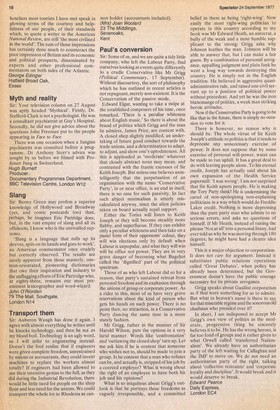Paul's conversion
Sir: Some of us, and we are quite a tidy little company, who left the Labour Party, find ourselves looking at events quite differently to a cradle Conservative like Mr Grigg (Political Commentary, 17 September). Without discourtesy, the sort of philosophy which he has outlined in recent articles is not repugnant, merely non-existent. It is the Conservatism of the passive mode.
Edward Elgar, wanting to take a swipe at the established composers of his time, once remarked, 'There is a peculiar whiteness about English music.' So there is about the brand of politics which Grigg and the man he admires, James Prior, are content with. A closed shop slightly modified, an undertaking of future good conduct towards the trade unions, and a determination to adapt, to adjust, and show one's uptodateness. All this is applauded as 'moderate' whatever that cloudy abstract noun may mean, and contrasted with the frantic excesses of Sir Keith Joseph. But unless one believes unintelligently that the perpetuation of an organisation with the name 'Conservative Party', in or near office, is an end in itself, there is no case for such passivity. In fact such abject minimalism is utterly miscalculated anyway, since the alien policies taken on board actually repel support.
Either the Tories will listen to Keith Joseph or they will become steadily more flabby, and superfluous. If they can exhibit only a peculiar whiteness and then take on a pastel form of their opponents' colour, they will win elections only by default when Labour is unpopular, and what they will win will be office not power. They are in very grave danger of becoming what Bagehot called the 'dignified' part of the political spectrum.
Those of us who left Labour did so for a reason, that party's sustained retreat from personal freedom and its exaltation through the unions of group or corporate power. As a rider to this, most of us have very grave reservations about the kind of person who gets his hands on such power. There is no point then, no attraction, in a Conservative Party dancing the same tune in a more stately fashion.
Mr Grigg, rather in the manner of Sir Harold Wilson, puts the options in a very lurid manner. Words like 'confrontation' and 'outlawing the closed shop' turn up. Let me ask him if he is content that someone who wishes not to, should be made to join a group. Is he content that a man who refuses can be, and actually is, stripped of his job by a coerced employer? What is wrong about the right of an employee to have both his job and his opinions?
What is so iniquitous about Grigg's outlook is that he portrays these freedoms as vaguely irresponsible, and a committed belief in them as being `right-wing'. Now easily the most right-wing politician to operate in this country according to my book was Mr Edward Heath, an autocrat, a bully of the weak and a most humble supplicant to the strong t Grigg asks why Johnson loathes the man. Johnson will be able to answer that, but I can make a fair guess. By a combination of personal arrogance, appalling judgment and plain funk he went a long way towards destroying this country. He is simply not in the English tradition. He believed in aggressive quasiadministrative rule, and raised one civil servant up to a position of political power without precedent. And yet he was the iron blancmange of politics, a weak man striking heroic attitudes.
Now if the Conservative Party is going to be like that in the future, there is simply no occasion to vote for it.
There is however, no reason why it should be. The whole virtue of Sir Keith Joseph's attitude to politics is that it tends to deprecate any unnecessary exercise of power. It does not suppose that by some exercise of personal will-power, water can be made to run uphill. It has a great deal to do with leaving people alone. To his eternal credit, Joseph has actually said about his own expansion of the Health Service papermill: 'I was wrong'. I am not surprised that Sir Keith upsets people. He 'is making the Tory Party think! He is undermining the cartel of non-apologising non-explaining politicians in a way which would do Freddie Laker credit. Nothing is more depressing than the pure party man who admits to no serious errors, and asks no questions of himself. If Mr Heath, instead of raising the phrase 'Not at all' into a personal litany, had ever told us why he was moving through 180 degrees, he might have had a clearer idea himself.
This is a major objection to corporatism. It does not care for argument. Instead it substitutes public relations operations called 'Great Debates', when policy has already been determined, but the Government doesn't have the public courage necessary for its private arrogance.
Grigg speaks about Gaullist corporatism as if that were something for us to admire. But what in heaven's name is there to say for that miserable regime and the sonorous old charlatan who presided over it?
In short, I am indisposed to accept Mr Grigg's own view of politics as the moderate, progressive thing he sincerely believes it to be. He has the wrong heroes, is far too fond of groups and is rather given to what Orwell called 'transferred Nationalism'. We already have an authoritarian party of the left waiting for Callaghan and the IMF to move on. We do not need an authoritarian party of the right, talking about 'collective restraints' and 'corporate loyalty and discipline'. It would break and it would deserve to break.
Edward Pearce Daily Express, London EC4


































 Previous page
Previous page